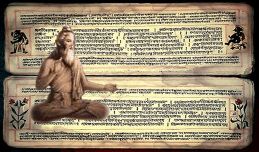
Akṣapāda Gautama is the acclaimed author of the Nyāya Sūtras, the foundational text of the Nyaya school of Indian philosophy. The date when the text was composed, and the biography of its kāraka is unknown, but variously estimated between 6th-century BC and 2nd century. The text may have been composed by more than one author, over a period of time. The text consists of five books, with two chapters in each book, with a cumulative total of 528 aphoristic sutras, about rules of reason, logic, epistemology and metaphysics.
The Nyāya Sūtras is a Sanskrit text, notable for focusing on knowledge and logic, and making no mention of Vedic rituals. The first book is structured as a general introduction and table of contents of sixteen categories of knowledge. Book two is about pramana (epistemology), book three is about prameya or the objects of knowledge, and the text discusses the nature of knowledge in remaining books. It set the foundation for Nyaya tradition of the empirical theory of validity and truth, opposing uncritical appeals to intuition or scriptural authority.
